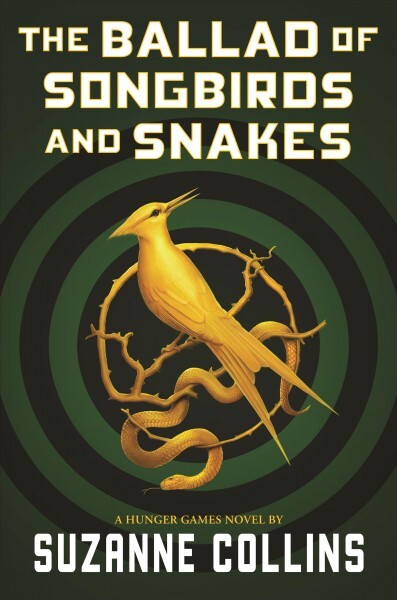‘The Ballad Of Songbirds And Snakes’ Is A Lackluster Prequel To ‘The Hunger Games’

The Ballad of Songbirds and Snakes
by Suzanne Collins
Hardcover, 540 pages | purchase
Buy Featured Book
Your purchase helps support NPR programming. How ?
With her Hunger Games novels, Suzanne Collins harnessed a combination of tortuous plots, adolescent chat up, dystopian worldbuilding and insidious intimations of cannibalism to sell more than 100 million books around the populace. The premise was invincible : authoritarian regimen forces children to fight to the death on live television ; rebellion ensues. But much of the serial ‘ appeal came from the peaky charisma of protagonist Katniss Everdeen, the sharpshoot adolescent who wins the games and starts a revolution while choosing between two boys who are as alike in prettiness as they are unlike in Weltanschauung. The series has a distinct Roman imperial vibration — far-flung districts sending their harvests to the glorious and corrupt Capitol, feasts complete with vomitoria, gladiatorial contests to the death ( but for kids ! ). The country is called Panem, after the Latin phrase “ panem et circenses, ” or bread and circuses — what the Roman satirist Juvenal identified as the convention for quieting a restive population. ( In 1984, George Orwell calls this means “ prolefeed. ” ) The crave games, of course, are the circenses, the Capitol ‘s way of controlling the proles through the match mechanism of entertainment and terror. Collins ‘ newly novel, The Ballad of Songbirds and Snakes, is a baggy, meandering prequel to the events of The Hunger Games that tells the history of Katniss ‘ nemesis and Panem ‘s authoritarian ruler, Coriolanus Snow. With his Roman tyrant ‘s identify, surgically altered boldness and hint smell of lineage and roses, Coriolanus appeared as a distant villain throughout most of The Hunger Games serial. It ‘s entirely the last episode that gives him a touch of mystery — in its final pages, sentenced to populace performance, he rather dies laughing, choked on his own blood.
Read more: 15 Mystery Series That’ll Keep You Guessing
so, how did he get there ? Why was he laughing ? What ‘s with the blood ? The Ballad of Songbirds and Snakes opens on adolescent Coriolanus at home, making a boodle soup that fills “ the kitchen with the olfactory property of poverty. ” once golden, the Snows have fallen on arduous times. Coriolanus has been chosen to mentor one of the tributes for the hunger games, a charming waif named Lucy Gray, after William Wordsworth ‘s ballad. In helping her to victory, he sees a probability at social redemption and a coveted eruditeness to the university. inevitably, he falls for her. But the love narrative is tinged with opportunism from the begin. At first, saving her means helping himself, but finally, he has to choose between her and his glorious political future. One of Collins ‘ dogged questions in the first three books is : To what extent is character warped and corrupted by circumstances ? Is anyone, to quote Corionalus ‘ Shakespearean namesake, actually “ author of himself ” ? Characters throughout the series find themselves altered by drugs ( “ morphling ” is the opiate of choice ) and poison ( tracker jacker wasp malice, which drives humans insane with fear and bloodlust ), along with the more everyday influences of poverty, privation and war. No one comes out of the games with clean hands. It ‘s just about, as one of the contestants says, keeping as much of yourself entire as you can .
The wonder of how much of quality is unconditioned, how much formed, becomes a more denotative — OK, painfully obvious — composition in The Ballad of Songbirds and Snakes. The novel is a pedestal for two opposing worldviews. The barbarous Hobbesian Gamemaster tells Coriolanus that the hunger games are a reminder that people are monsters kept alone in check by strong predominate : “ What happened in the arena ? That ‘s humanness undressed. … That ‘s world in its lifelike state. ” interim, in cattiness of the cruelty she suffers in the stadium, Lucy Gray believes that there is “ a natural good built into human beings. ” The argument matters, the Gamemaster says, “ [ b-complex vitamin ] ecause who we are determines the type of governing we need ” — a democracy or a absolutism.
Readers who loved the moral ambiguity, crisp write and pitiless pace of the first three books might be less concern in an overwork parable about the value of Enlightenment thinking. That ‘s not to say Collins ca n’t or should n’t work serious moral and political questions into her novels : It ‘s the sheer obviousness that drags, the way that we know what the properly answer is supposed to be. Coriolanus is just a flat, crafty sociopath. In contrast, Katniss was allowed contradictions : She was a hurt, poisonous, plotting, independent, ferocious insurgent — will, at respective points, to murder, steal and denounce her love ones for a larger goal. As a protagonist, there was something gloriously undidactic about her. She was a freak, she was a killer, and she was besides a principled and intractable writer of herself. so, are we selfish animals or intellectual beings, adequate to of altruism and self-governance ? The Ballad of Songbirds and Snakes tells us what we should think. But The Hunger Games allowed for both .


